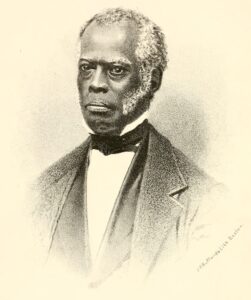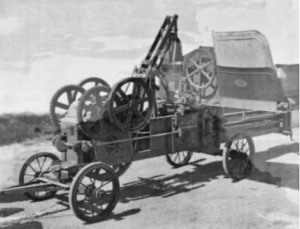Join us on a journey through our shared history told through tales of perseverance, pain, trial, and triumph. Together we aim to learn how to cultivate a better future as we remember our past. New stories will be continually added to this post and shared in our emailed newsletter.
Story #3: Published September 20, 2022

In 1803 in Raleigh, North Carolina, a young man was born. He would later become an activist, a businessman, a free man, author, leader and inspiration. Lunsford Lane was his name and at the time of his birth he was none of the aforementioned things, he was a slave. Born to what were called house slaves at the time, Lunsford grew up doing house duties around a rich, Raleigh family plantation. He had relative security compared to his fellow slaves that worked in the field but took note of how they were frequently bought and sold, leaving children without parents and parents without children. Happy to still live with his own parents, he quickly realized the only security against forced separation, was one’s freedom.
 It all started with a basket of peaches, given to him by his father. Up until then he was a businessman only in thought, but these peaches were the young man’s ticket. After selling the peaches for profit he purchased a fresh bushel of tobacco to cure. The details of his rise to success are somewhat lacking but what is known is Lunsford developed a sharp skill for negotiation as well as curing tobacco. Along with clay pipes made of reeds and mud, Lunsford’s tobacco was noted as having a particular sweet smooth flavor and garnered much local acclaim. Even more impressive, is Lunsford was a slave from morning until dusk and only at night could he produce, sell, and market his tobacco products. His product was hot and there was much demand. Soon he became the supplier of the North Carolina Senators and Representatives and transformed from a local success into a regional one.
It all started with a basket of peaches, given to him by his father. Up until then he was a businessman only in thought, but these peaches were the young man’s ticket. After selling the peaches for profit he purchased a fresh bushel of tobacco to cure. The details of his rise to success are somewhat lacking but what is known is Lunsford developed a sharp skill for negotiation as well as curing tobacco. Along with clay pipes made of reeds and mud, Lunsford’s tobacco was noted as having a particular sweet smooth flavor and garnered much local acclaim. Even more impressive, is Lunsford was a slave from morning until dusk and only at night could he produce, sell, and market his tobacco products. His product was hot and there was much demand. Soon he became the supplier of the North Carolina Senators and Representatives and transformed from a local success into a regional one.
With $3,500 saved, the young entrepreneur bought his freedom as well as his parents, the equivalent of $65,000 today. Due to a North Carolina law at the time stating that a slave must only be set free from “honorable or noble dead”, Lunsford took his family to New York where he petitioned the court and was granted freedom. Before leaving New York to return to his Tobacco business, he and a fellow freed black man where falsely accused of being runaway slaves in what then amounted to a kidnapping attempt. With papers in hand proving his status, Lunsford still had to argue his case in court and wasn’t sure he’d be set free until his white lawyer, gave a passionate plea on his behalf. Finally cleared and ready to return to his native Raleigh, he set out.
Already popular among politicians at the Capitol, he was formally employed as a handyman by the State Capitol and maintained a monopoly of pipe tobacco amongst the politicians. Yet once again, another legal issue would come in Lunsford’s way. North Carolina had a law at the time that required any free black man that had lived outside of North Carolina for more than 20 days not be allowed to reside in the State. Born and raised in North Carolina, he petitioned the court for an exemption, but was denied and kicked out of the State of North Carolina in 1841.
Returning to the North, he started raising money amongst abolitionists and secretly returned to Raleigh in 1842 to purchase the freedom of his new wife and child. Upon completing this, Lunsford set out to preach the injustice of slavery to enslaved blacks as well as whites. As he was a successful businessman with more money than the average white, he dispelled the ideals of white superiority and soon became a target of angry mobs. Assisted by friends amongst the mob, he was placed in the local jail and kept there until the mob subsided. Yet, when he finally set out from the jail, he was captured by the mob who initially set out to hang him. Because he supposedly had white friends among the angry crowd, he was tarred and feathered instead. Some of these same friends hid Lane and his wife and child afterwards and smuggled them out in the night to head back to the North.
After this event, not much is known of Lane. He does not include events from 1842-1863 in his biography but does include that in 1863 he worked in a Union Army Hospital. From what we do know, we can admire and honor Lunsford Lane. Born a slave but determined to purchase his family’s freedom and transform their lives with his entrepreneurship and determination.
Story #2: Published August 23, 2022

This is the story of William Chester Ruth told through his eyes.
My father’s name was Samuel. He was the child of a white South Carolina slave owner and a Black mother enslaved on the man’s farm. He was the only bi-racial child born to his mother and faced resentment from both his Black and white siblings. His Black siblings worked the fields while he was a house servant. His mother was sold while he was still a young child and he told me one of his earliest memories was that of his mother being torn from him and put into chains. When my father was 13 and in midst of civil war, he was taken into a prominent African American Union Soldier unit. He enlisted and served until the war’s end and then married a fellow soldiers’ sister and settled in Pennsylvania. My mother & father found the Quakers and the Amish to be much more tolerant of people of color and decided that the Quaker areas of Chester County, Pennsylvania would be a good place to raise a family. Louisa, my mother, came from prominence (especially for Southern African Americans of the time). Her father was an attorney, a pastor and a recipient of the Congressional Medal of Honor for his service during the Civil War. My mother was college educated and had ambitions, but when she became pregnant with my eldest sister, she halted her studies and started a domestic worker business doing laundry, child sitting and other household duties for pay.
The 7th of 9 children my name is William Chester Ruth. I was born in 1882 and at the time of my birth, my father rented plots to raise crops and tanned leather. Our family was working toward saving enough to purchase our own farm and did so when I was 3, buying 20 acres for $850. As one would expect from an early age, I experienced the difficulties associated with working on a farm and the farm equipment. My father had quite the entrepreneurial spirit and purchased a grain thrasher and baler in which our family would use to rent out to other grain producing neighbors. It was my task to fix the machine and keep up with everyday operation of it for our family’s customers. Often seemingly getting in the way rather than helping, I was known to have frequently taken apart a piece of equipment and then had not been able to put it back together. On these occasions, my father would whip me as if I stole, and it was my mother who would remind me of his up bringing as a slave – the scars he carried from his own beatings both by his enslavers and the other slaves. She would assure me that he was simply being so hard on me because in the world from which he came, the smallest mistake was met with the cruelest of punishment and only the hard would survive.
As I got older, my technical and mechanical knowledge increased and by the age of 12 I was forging my own nails made from scrap metal and selling them. The other lessons I learned from my father were how to have business success. By the time I moved out of the family home, my parents owned over 130 acres and two large homes. With the additional land I also saw my family’s struggles with finding enough labor to harvest all of the crops they produced. This led me to begin learning how to model scale and produce new inventions for the family.

A bale press and feeding belt
By 1912, I decided to open my own business as a blacksmith servicing metal agricultural tools for the local Amish, Mennonite, and Quaker farmers. Through working with so many farmers as well as my own farming experience I got a good sense of many of the problems faced by the grain farmers of the time. One frequently experienced problem was the excessive weight and inherent danger in the machinery used to bale and move hay into barn attics for storage. Looking for a solution, in 1924 I invented my first commercial product: a grain baler that used less direct human labor as well as a grain elevator that would transport the grain from the baler into high up attic barns and towed behind a truck. In 1928, after filing patents, I began manufacturing my two inventions out of my blacksmith shop. The product was an immediate success in the local area and soon began to be a national success as word spread. Once I had sold 21 of my Ruth Bale Feeders and the grain elevator system in a single day. I ended up selling a total of 5,000 nationwide. We had delivered the machines all over the local and reaching as far as California and Canada, all while still being assembled in the small blacksmith shop in Lancaster county. In an interview I did for Ebony magazine, I had quoted that between 1928 and 1950 I did an average annual sales of $50,000, which is equivalent to $9,440,000 today!
Much like this Black Church Food Security Network, I was not only a man of agriculture but also a man of God and lead a small ministry at the Church of Christ Meetinghouse in Ercildoun, Pennsylvania. This was a small Quaker community in which I encouraged African Americans to move to. I retained the head mantle of this church until the age of 70, when I stepped down to retire.
William Chester Ruth died in 1971 in an automobile accident but his memory lives strong especially amongst senior and retired farmers in the area who still have direct memories of Ruth and the revolution in efficiency and man power his machines presented to their farms. His legacy as one of the quiet founding fathers of African American Agriculture and Entrepreneurship live on to this day and his story is still told in public settings across the state by his grandchildren.
Story #1: Published August 12, 2022

The year is 1618 and a young warrior, around the age of 19, is engaged in battle against the Portuguese-backed Imbangala Empire. His people, the Mbundu, once were allies with the new white men but as quick as the lightning hits the earth and the rain hits the sand these new “allies” intentions changed. The Portuguese, taking advantage of the tribal divisions of 17th century Angola, promised the Imbangala tribe power and riches in exchange for whole families and villages of the other tribes. Between 1617-1621, 50,000 Angolan people of various tribal groups were captured, enslaved and sent to Portuguese colonies in Brazil and the Caribbean. As we look back to the young man engaged in battle, overrun by the more numerous enemy, he is taken captive and sent off to the coastal city of Luanda to be sold. Treated as a commodity rather than the child of God he is, he is inspected, given a price, and marched in chains onto the ship of those who purchased him. With no regard for his identity or customs he is stripped of his name and assigned the Western name of Anthony.
Anthony, destined for the Portuguese colonies of the New World, was then captured by the Dutch Navy, the enemies of the Portuguese and instead taken to English settlements in Virginia. After arriving in Virginia as one of the first Black people to ever step foot, it is decided that Anthony would be sent to Bermuda to farm tobacco from 1619-1621 until sold, once again, to an estate in Virginia. English colonies like Virginia and Maryland did not have laws pertaining to slavery until the years 1661 and 1664 and at the time Anthony arrived, most slaves where given a period they would work for and after completing that time would be given a plot of land. During his period of enslavement Anthony’s plantation came under attack in 1622 by the Powhatan Nation, a coalition of Native American tribes united to abolish the new European Colonialists from their land. Anthony, being in this new country by none of his own desire or accord, soon found himself at risk of dying in combat for the 3rd time in 4 years. He narrowly escaped death, as the records show most of the inhabitants of the plantation died in the attack. Between the 1622 attack and 1635, records don’t show the events in Anthony’s life but it can be assumed he farmed tobacco, the primary cash crop of Virginia at the time.
In 1635, Anthony, along with his wife Mary, are concluding the period of their indentured servitude (slavery) and taking the last name of Johnson. With the completion, Anthony Johnson also received a plot of land in Northampton County, Virginia where he began to grow crops such as corn and tobacco. As the Johnson farm grew, records show his purchasing of cattle as well as indentured servants and enslaved people. Mr. Johnson and a slave by the name of John Casor went to court over the terms of his enslavement and in 1655 became the first recorded civil court case in the US to rule an African person as a slave. Two years later in another court case, Anthony was schemed out of 100 acres of property by a neighbor who claimed he owed debt. Instead of contesting it, he moved his family to Somerset County, Maryland. This in turn made Anthony and his wife Mary the first African commercial farmers in the history of Maryland. Anthony’s farm was 300 acres and primarily farmed tobacco. The farm ran from 1658-1670 until the year of Anthony’s death.
With a quickly developing culture of state sanctioned oppression, enslavement, and discrimination, Anthony’s wife and children where not given his land. It was declared that as a Back man, he was not a citizen and by 1730 all records of the family ceased. But Anthony’s legacy lives as he was aboard the first ship of Africans to ever step onto the New English colonies of Virginia and Maryland, to becoming one of, if not the first, African farmers and businessmen in Virginia, to being the very first official one in Maryland.
So when you’re feeling tired, hot, lazy and sore in this season of your life, please remember the stripping of one’s name, their identity, religion, as well as the physical suffering and the hard work that our ancestors went through just to survive – and if lucky, to be free. God Bless.

